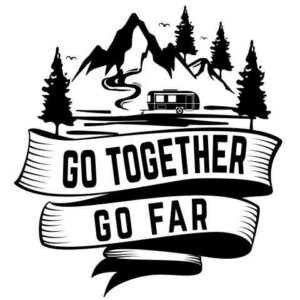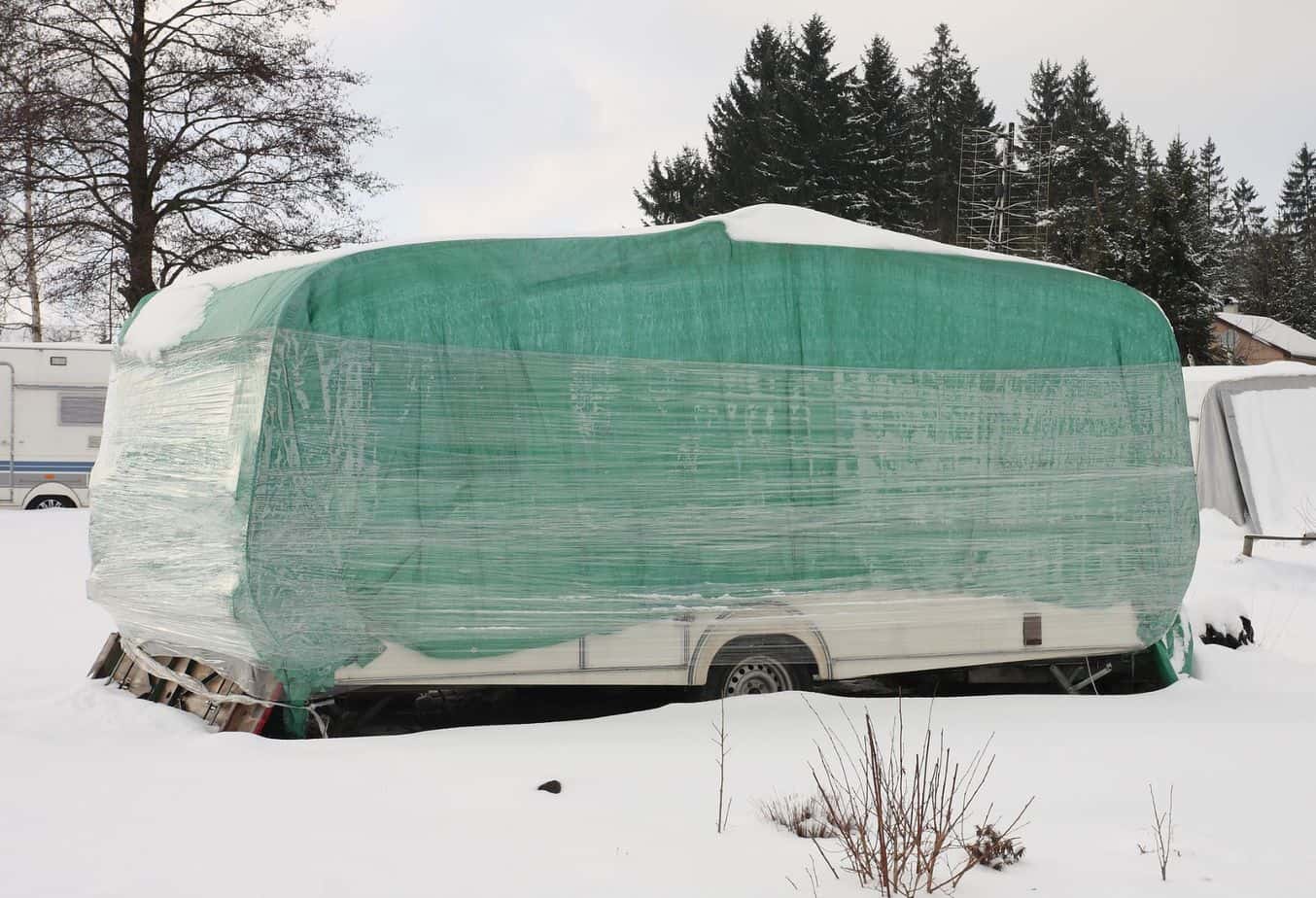The beautiful thing about RV camping is the almost unlimited freedom you can enjoy. You can take your RV almost anywhere and still enjoy the “creature comforts” of home.
Of course, RV camping in colder temperatures introduces a whole bunch of things you have to square away – especially keeping your RV water lines from freezing. Proper winterization (heat tape, antifreeze, heating pads, etc.) is essential to prevent your RV plumbing from popping when the mercury dips.
In this detailed guide, we run through everything you need to take care of to keep your RV water lines from freezing while camping.
Let’s jump right in!
Correctly Winterizing Your RV is Critical
As odd as it sounds at first, it’s really easy to stop thinking of your RV as a “home on wheels” and instead start thinking of it as a regular old vehicle – like your car or truck – particularly from a maintenance perspective.
Most folks don’t take any steps to winterize their car or truck when the white stuff starts falling and the temperatures drop below freezing.
We don’t have to!
If you’re thinking of your RV as a standard vehicle, you might also fall into this trap.
That would invite disaster, though.
You see, your RV is so much more than a standard vehicle. It has many amenities of home built right in, and you have to be sure that you properly winterize them to avoid serious plumbing emergencies.
The odds are good that your RV has quite a bit of onboard water, not just the water you use for cooking, cleaning, and washing up. Wastewater can freeze just as quickly as clean water – and it’s even more of a nightmare to clean up if frozen pipes burst.
Cleanup catastrophes aren’t the only reason to winterize your RV, though.
Plumbing that bursts needs to be addressed right away. And that almost always means tearing your RV interior down to the framing to get the plumbing that has become compromised (and inspecting every other square inch, too).
That gets expensive in a hurry.
Proper weatherization guarantees that you won’t have to worry about your pipes freezing up, your plumbing popping, or having to deal with flooding of clean or wastewater caused by a leak springing from frozen pipes that have finally thawed.
Don’t forget to check out our Recommended RV Equipment list!
How Fast Can RV Pipes Freeze Up?
RV pipes can freeze up a lot faster than you expect – but that doesn’t necessarily mean that a surprise overnight low temperature will put you in the danger zone.
No, the thermal mass of your RV is going to do a halfway decent job of protecting you against those sporadic and surprise low temperatures. Just because you got below freezing for 12 – or even 24 hours – doesn’t mean that your RV will be a mess.
At the same time, if you’re looking at a couple of days of temperatures below freezing (certainly a week straight of these kinds of temperatures), you need to be sure that you are properly winterized.
The internal heating components of your RV will do everything they can to keep your plumbing “slushy,” but even those might not be enough to fight back a severe chill.
Winterize a couple of weeks ahead of anticipated cold weather, and you’ll enjoy a lot of peace of mind.
How to Keep RV Water Lines From Freezing While Camping
There are a couple of key components of your RV you need to keep from freezing, with specific strategies for preventing that frees up from happening highlighted below.
Water and Sewer Lines
Water and sewer lines need to be the first thing you winterize each year.
If you are traveling down the road and cold weather is on the horizon, make sure you fill up your freshwater tank each night and disconnect all the water hoses. This acts as an immediate buffer to avoid serious problems.
Secondly, you want to make sure that you use heat tape specifically designed for this application on your water hoses.
After that, cover them with a layer of foam insulation and then run them back through with another layer of heat tape, and you’ll have a pretty “set it and forget it” kind of solution to prevent freeze-ups.
It may not be harmful to open all of your faucets and let them drip overnight.
You’ll waste a minimal amount of water, but you’ll guarantee that your water and sewer never freeze solid.
Water and Holding Tanks
After squaring away your pipes, it’s time to focus on preventing freeze-ups inside your tanks.
You could go with insulated options (they can get a little expensive), but a better thing to do is simply use your water as little as possible. Keep your tank valves closed regularly and only opened them up when necessary.
Heating Pads
Of course, it might not be a bad idea to use heating pad technology stuck to your water tanks to keep water from freezing.
Adhesive heating pads (including the kinds you can use on your own back) can be stuck directly to the tanks themselves anytime the temperature threatens to go below 40°F.
These pads can be hooked up by battery power open (or designed to pull from your generator/inverter) and turned on only when necessary. They’ll make sure that your water never freezes solid.
Antifreeze
RV antifreeze should be run through your black and gray water tanks.
Just be sure that you aren’t even using it in water that you will consume or wash with.
Be sure that you use RV-specific antifreeze as well. Each brand will have its instructions to maximize its benefits, and you’ll want to follow them to the letter.
Closing Thoughts
Overall, winterizing your RV is a lot easier than most people realize.
It’s a lot less expensive to pull off than fixing burst pipes. Use the tips and tricks highlighted above to master how to keep RV water lines from freezing while camping, and you won’t have anything to worry about going forward!
Don’t forget to check out our Recommended RV Equipment list!
Get a FREE copy of the Go Together Go Far Travel Trailer Hookup and Disconnect Checklist when you sign up for the Go Together Go Far Newsletter!
Want to learn more about different types of RVs? Check out:
- Best Off-Road Camper Trailer Under $10,000
- Best Bunkhouse Travel Trailer Under 30 Feet
- Are Lance Travel Trailers Any Good?
- Do Rope Lights Deter Rodents?
- What Are the Best Names in the RV Industry?
- 3 Best Travel Trailers for Family of Four
- Blue Ox SwayPro Basics: Top Questions Answered
- Adding A Washer Dryer To Travel Trailer? What You Need To Know.
- Best Drone For Camping, Backpacking, and RVing: A Complete Guide to Drones for RVers
- Furniture and RVs – How To Get It Through the Door…
- How To Get Rid Of A Poop Pyramid In RV Black Tank
- Do You Know How Long To Keep Fresh Water In RV Tank Storage?
- What Is The Best Outdoor Security Camera System For Your RV?
- RV Bumper Mount Grills: 5 Best Options For Your RV Or Camper
- Best Electric Tankless Water Heater for Your RV. What You Need To Know
- Read Before You Buy! How to Find the Best Scooter for RV Camping
- 3 Best Travel Trailers for Family of Four
- Top RV Brands: What Are the Best Names in the RV Industry?
- Lance Campers: What Makes Them So Different?
- Best Bunkhouse Travel Trailer Under 30 Feet
- Best Off-Road Camper Trailer Under $10,000
- Best Weight Distribution Hitch With Sway Control For Travel Trailers in 2022
- What Are The Best Built Travel Trailers? Things To Consider.
- How Does An RV Refrigerator Work? A Quick Guide.
- Why Does My RV Carbon Monoxide Detector Keep Beeping? A Quick Guide.
- Where Is The Power Converter In My RV Or Travel Trailer
- What is the Best Generator for 50 Amp RV?
- Wireless RV Security Camera Systems: Is Solar Powered Security Without Wi-Fi An Option?
- Best Portable Air Conditioner for Camping for 2022
- How to Find the Best 3500 Watt Inverter Generator for RV Camping
- Best Propane Generator For Your RV: Read This Before You Buy!


